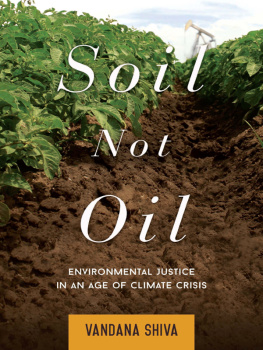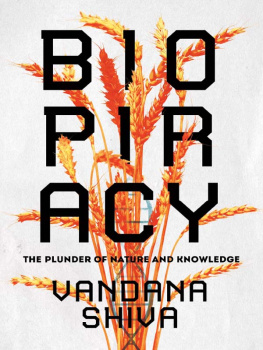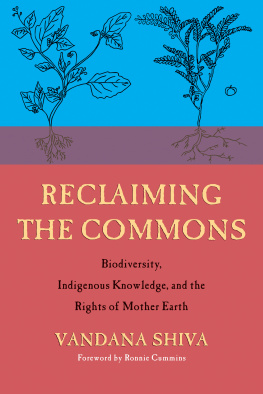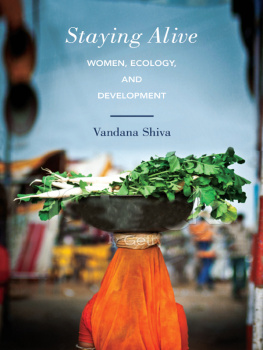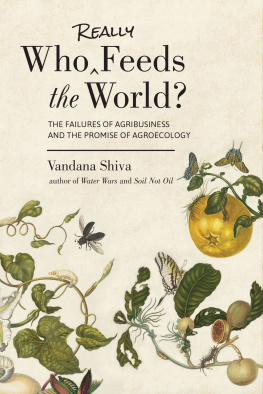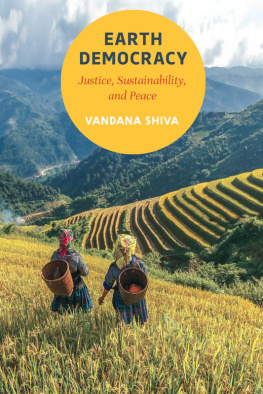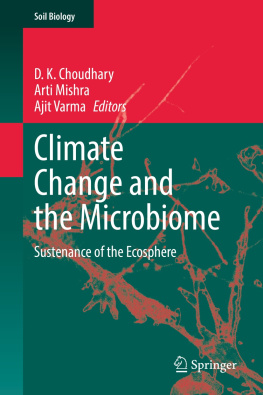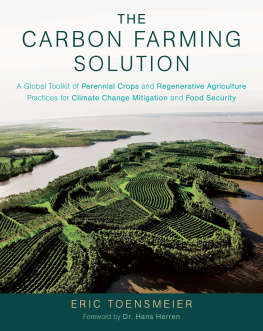
SOIL NOT OIL
SOIL NOT OIL
Environmental Justice in an Age
of Climate Crisis
VANDANA SHIVA

Berkeley, California
Copyright 2008, 2015 by Vandana Shiva. All rights reserved. No portion of this book, except for brief review, may be reproduced, stored in a retrieval system, or transmitted in any form or by any meanselectronic, mechanical, photocopying, recording, or otherwisewithout the written permission of the publisher. For information contact North Atlantic Books.
Published by
North Atlantic Books
Berkeley, California
Cover photos iStockphoto.com/Jason Lugo; iStockphoto.com/shotbydave
Cover design by Jasmine Hromjak
Book design by Adept Content Solutions
Printed in the United States of America
First published in 2008 by South End Press.
Soil Not Oil: Environmental Justice in an Age of Climate Crisis is sponsored and published by the Society for the Study of Native Arts and Sciences (dba North Atlantic Books), an educational nonprofit based in Berkeley, California, that collaborates with partners to develop cross-cultural perspectives, nurture holistic views of art, science, the humanities, and healing, and seed personal and global transformation by publishing work on the relationship of body, spirit, and nature.
North Atlantic Books publications are available through most bookstores. For further information, visit our website at www.northatlanticbooks.com or call 800-733-3000.
Library of Congress Cataloging-in-Publication data is available from the publisher upon request.
1 2 3 4 5 6 7 8 9 United 20 19 18 17 16 15
T wo hundred years into the fossil fuel era, CO2 emissions have created a greenhouse effect that is responsible for global warming and is leading to a climate crisis. An all too likely increase in temperatures of 3 to 5 degrees Celcius will result in the melting of the polar ice caps and glaciers, and the intensification of floods, droughts, and cyclones. Some of these effects are already being felt. If we do not halt the temperature increase the climate crisis will dramatically change how we live.
And it will decide whether we live or perish.
Besides the problematic gift of climate chaos, the age of oil is up against another limitpeak oil. Conceptualized by M. King Hubbert in 1956, peak oil refers to the point at which the world reaches the highest possible level of oil production. After that, oil production must necessarily decrease. As Heinberg has put it, the party is over.
Peak oil and the end of cheap oil make it imperative that we change the way we live. We need to move beyond oil. We need to reinvent society, technology, and economy. We need to do it fast and we need to do it creatively. We can.
Climate chaos and peak oil are converging with a third crisis the food crisis. The food crisis results from the combined impacts ofthe industrialization and globalization of agriculture. The very forces and processes that have promised cheap food are pushing food beyond peoples reach. Prices of food are rising worldwide. More than 33 countries have witnessed food riots.
In early June 2008 an emergency meeting of the UN was called to address the crisis of climate change and the food crisis. As expected, the same corporate interests that have created the two crises tried to offer the disease as the curemore fossil fuel-based chemical fertilizers, more non-renewable genetically engineered and hybrid seeds bred to respond to the intensive use of chemicals, more corporate control of food, and more globalized trade.
The food crisis reflects a deeper crisisthe creation of redundant or disposable people and, alongside them, the potential for violence and social and political instability.
Disposability of people is built into the denial of food to millions as well as the destruction of rural livelihoods by the substitution of human energy with machines powered by fossil fuels. The very definition of productivity in the industrial paradigm is labor productivity, i.e., the fewer human beings involved in production, the more productive a process is, even if it uses more energy and more resources and produces less per unit of energy and resource inputs.
While wide-ranging wars, colonial expansion, and slaveryamong other thingshave long resulted in human-generated misery and destruction, never before have the actions of one part of humanity threatened the existence of the entire human species. We are now facing a triple convergence of crises, each of which threatens our survival.
Climate: Global warming threatens our very survival as a species.
Energy: Peak oil spells the end of the cheap oil that has fueled the industrialization of production and the globalization of consumerism.
Food: A food crisis is emerging as a result of the convergence of climate change, peak oil, and the impact of globalization on the rights of the poor to food and livelihood.
Of the three crises, the emerging food crisis poses the most immediate threat to the survival of the poor. The food crisis emerges from two historical processes, one long-termthe industrialization of agriculture and the uprooting of peasants and family farmers from the landand one more recentthe effects of globalization and trade liberalization ofagriculture on food security and food sovereignty. The impact of climate change on agricultural production, along with such false solutions to climate change as industrial biofuels, which divert food and land from the poor to the non-sustainable energy needs of the rich, further exacerbate the food crisis.
We can and must respond creatively to the triple crisis and simultaneously overcome dehumanization, economic inequality, and, ecological catastrophe.
The energy and climate-change crisis stands as a unique social and ecological challenge. First, the very survival of the human species as a species is threatened. Second, no other challenge is so global in scope. There is no place to hide. Third, climate change is impacted by diverse human activitieshow we shop, how we move, how we live, how we eat. Solutions cannot be restricted to one or two sectors. They will touch all aspects of our lives. Mitigation and adaptation must happen across all aspects of our lives. Fourth, climate change results from what is done to the land, and its impacts transform the land. Air, water, land, biodiversity, and energy are intertwined elements of climate changeits cause and solutions. Fifth, those least responsible for climate change are worst affected by it. Peasants, indigenous peoples, and artisans who live outside the industrialized globalized economy, who have caused no harm to the earth or other people, are the worst victims of climate chaos. Over 96 percent of disaster-related deaths in recent years have taken place in developing countries. In 2001, there were 170 million people affected by disasters around the world, of which 97 percent were climate related. Sixth, resistance to the limitless destructiveness of the industrialized globalized economy is coming precisely from those least responsible for climate change, the women, the hawkers, and street vendors who stand in front of the juggernaut of fossil fuel-driven, energy- and resource-intensive development, refusing to be uprooted, refusing to be turned into disposable people, offering another paradigm and world viewof power and wealth, of nature and culture.
Climate change demands that we reduce fossil fuel use and CO2 emissions. It also demands that we power down through decentralized and decreased energy use. Peak oil and the end of cheap oil demand a paradigm shift in our conception of human progresswe need to imagine how we can live better without oil. The emerging food crisis will add another billion people to the billion who are already denied their right to food and condemned to hunger and malnutrition. The disposability anddehumanization of the poor and the marginal demand that we focus on the dignity of work and the relevance of ecological work The dominant model of development and globalization is inherently violent because it deprives the poor of their fundamental right to food, land, and livelihoods. By bringing back dignified work based on human energy and living energies we can mitigate climate change and make a transition to a society beyond oil, while ensuring food security and good food for all.
Next page
